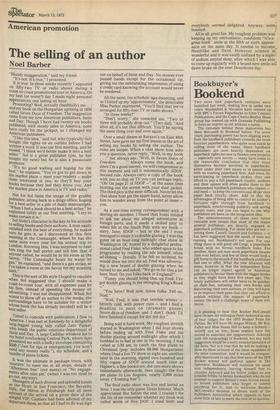Bookbuyer's
Bookend
Two more new paperback ventures were launched last week, making five in under two years. Weidenfeld & Nicolson have teamed up with BPC's Futura Paperbacks to form Contact Publications, and the Cape-Chatto-Bodley Head group has teamed up with Granada Publishing to form an imprint as yet without a name.
The rationale behind these manoevres has been discussed in Bookend before. For some years, purchasing power has been slipping away from the hardback publishers towards the more buoyant paperbackers, who quite soon could be calling most of the tunes. Since hardback publishers are now heavily dependent on paperback rights income to finance new projects — especially new novels — many have come to the reasonable conclusion that they must themselves become involved in paperbacks, either under their own steam or in association with an existing paperback firm. And since, by participating in paperback profits, they can afford to pay a full paperback royalty, authors and their agents will often prefer them to the independent hardback publishers who expect — and need — to keep the conventional 40 per cent paper back royalty share. Add to this the advantages of being able to control an author's fortunes right through from hardback to paperback, synchronising publicity and saving certain costs, and you can begin to see why publishers are keen on the integration idea.
The announcement of these two latest ventures now means that most of the major general publishers are directly engaged in paperback publishing. For those who are not — among them, Cassell, Deutch and Gollancz — it has been suggested that the sands of time are running out. Bookbuyer's not sure. For one thing there is still good old Corgi, a paperback house with no formal hardback links. For another, there are now more paperback houses than ever before, and few of them would look a gift horse in the mouth if the hardback publisher had one to offer. What the new alliances will mean, however, is that the independent firms can no longer expect agents or American publishers to favour them with the bigger books as they might have done five years ago. The lonely publishers will either have to be quicker on their feet, initiating their own books and discovering their own authors, or they will have to so improve their sales that they can afford to publish without the support of paperback money. On such a challenge, some of them will thrive.
It is pleasing to hear that Booker McConnell have chosen my colleague Peter Ackroyd as one of four judges for the 1975 Booker Prize for Fiction. He will have Mr Angus Wilson, Mr Roy Fuller and Miss Susan Hill to keep a fatherly/sisterly eye on him. Some readers have felt moved to associate the epigrammatic Ackroyd with the outpourings of Bookend, but any such suggestion would be a sorry misinterpretation of the facts. Nor is it true that he will be leaking a blow-by-blow account of the inner squabbles of the prize committee. And it would be irresponsibly inaccurate to say that first news of the 1975 Booker winner will perforce appear in The Spectator. Bookbuyer will maintain his usual iron independence, leaving himself free to chastise Ackroyd and his fellow judges on any possible follies, to berate booksellers who do not attempt to support Britain's main fiction award, to hound publishers who forget to submit anything for it, and to welcome Booker McConnell's decision to divest itself of the Publishers Association which appears to have done little of late to merit the title of so-sponsor.


































 Previous page
Previous page